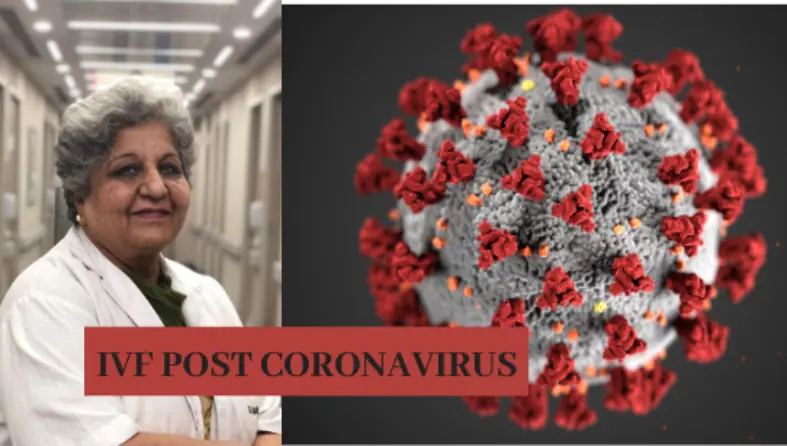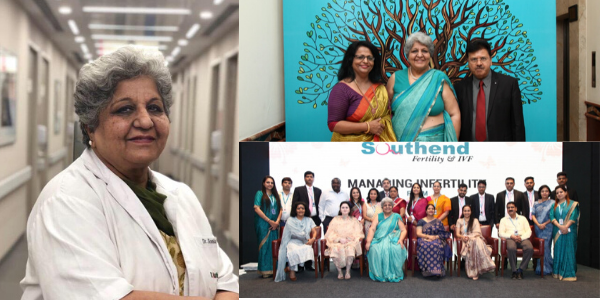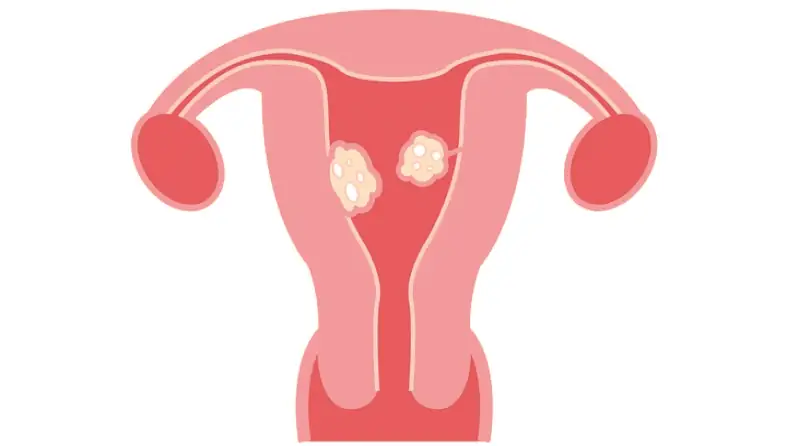Resuming Infertility Treatment During Corona Pandemic-Are We Ready ?
IVF Clinics, IVF Treatment
A novel coronavirus is a new coronavirus that has not been previously identified. This virus causes COVID-19 and is thought to spread from person to person, mainly through respiratory droplets or small respirable particles called aerosols produced when an infected person coughs or sneezes. Spread is more likely when people are in close contact with one another (within about 6 feet).
COVID-19 is spreading easily and sustainably in the community. Everyone is worried about catching the disease leading to fear, anxiety and social stigma. Considering the ambiguity regarding as to how long this pandemic would last, there is a likelihood of working in a COVID-19 positive situation for a long time and we should all be geared up and prepared to face this challenge.
Fertility issues can be extremely worrisome and stressful specially when there are delays and cancellations in the treatment. Given the current deficiencies in the knowledge of corona virus and fertility treatment , the pertinent question which comes to mind is — Is it safe to have IVF during this time ?The current data does not show any negative impact of corona virus on fertility treatment provided all precautions and protocols are followed diligently. It is purely a voluntary decision as there are no set guidelines or restrictions regarding the same. Even if one wants to delay starting the fertility treatment because of whatsoever reason, at least one must start planning towards that goal so that they are ready to go as soon as they want it.
Many fertility centres have opened albeit at reduced capacity by introducing safety protocols.
Keeping in mind the safety of the patients, the health care personnel and the community as a whole, Southend Fertility & IVF has adapted certain changes and is following proper guidelines and protocols without compromising the quality of care being provided to our patients.
Changes In The Hospital Environment
Patients Advised To Avoid Coming To The Hospital
- All symptomatic individuals who have undertaken international travel in the last 21 days
- All symptomatic contacts of laboratory confirmed cases
- All symptomatic health care personnel
- Anyone with any kind of fever or cough
- Asymptomatic direct and high risk contacts of a confirmed case
Standard Protocols
- To reduce face to face interaction-First interaction is done over phone.
- Where ever possible telemedicine and video calling facility is being used. Maximum effort is done to solve patients’ queries and problems over these consultations.
- Non-urgent outpatient visits, elective procedures & surgeries, are being deferred.
- Second triage is done at the centre by limiting points of entry, managing attendants and screening patients for respiratory symptoms.
- All health care personnel wear personal protective equipment as applicable and based on their role and this includes:-
-
-
- Mask
- Gloves
- Apron/gown
- Shoe cover
- Cap/ hair cover
- Protective eye cover
-
- All patients and health care personnel (HCP) perform hand hygiene before and after all patient contact and before putting on and after removing personal protective equipment (PPE), including gloves wherever necessary. The removed PPE is discarded in the medical waste bin as per protocols. Hand hygiene is maintained by using Alcohol Based Hand Rub (ABHR) with 60-95% alcohol for 20 seconds or washing hands with soap and water for at least 40 seconds. Administration ensures that hand hygiene supplies are readily available to all personnel at every step in every room.
- Hospital premises are properly cleaned with the recommended cleaning agents specially the frequently touched surfaces as door handles, light switches, bed rails, bed tables, phones, tables etc.
- Proper distance (6 feet) is maintained during interactions to limit contact with patients.
- Centre is well ventilated with opening of doors at regular intervals (for proper air circulation).
- Not more than six appointments for routine medical care (e.g elective procedure) each scheduled at 45 minute interval, per day are given.
- Social distancing is rigorously followed. Steps are taken to ensure all persons (patients and health care personnel) to follow :
-
- Hand hygiene
- Avoid touching face with hands , door handles and spitting
- No-touch receptacles for disposal, at healthcare facility entrances, waiting rooms, and patient check-ins throughout the duration of the visit.
- Numbers of staff providing care is limited. The doctors and staff are assigned at designated places according to the roster — OPD / OPERATION THEATRE .
- The movement of the staff is also restricted .No group activities are permitted
- After each patient interaction the doctor scrubs hands with soap and water and uses alcohol based disinfectant & ensures that the work place is properly cleaned and sanitized in their presence.
- Appropriate precautionary measures are implemented before patient arrival, upon arrival, throughout the patient’s visit.

Protocol For All The Patients
Before Arrival
- Patients are advised to call ahead and discuss the need to reschedule their appointment if they develop symptoms of a respiratory infection (e.g., cough, sore throat, fever1) on the day they are scheduled to be seen.
- Patients are requested to avoid use of public transport while coming to the centre.
- All patients are required to fill an online SELF DECLARATION form before their scheduled appointment.
Upon Arrival and During the Visit
- Use of alcohol based sanitizer before entering the centre — the same is provided by the staff at the gate.
- Social distancing – Each patient is allowed to be accompanied by ONE attendant only. If the attendant wishes to accompany the patient during consultation, she/he will has to wear a face mask and gloves throughout the visit . In case the attendant doesn’t wish to accompany the patient during consultation, he/ she has to sit in their personal vehicle and not in the waiting area inside.
- Ensuring that, at the time of patient check-in, all patients are
- Asked about the presence of symptoms of a respiratory infection
- history of travel to areas experiencing transmission of COVID-19 or contact with possible COVID-19 patients.
- Required to fill in a personal declaration and travel history form for the same.
- Wearing a facemask and gloves upon entry and throughout their visit.
- The patient once inside the centre is required to complete the pre-consultation formalities at the front desk ensuring the safe distance between the staff and the patient. She and her attendant (if any) is required to fill up the self declaration and screening/ travel history forms before the consultation. The staff ensures that a self attested photocopy of an identity proof of all the patients have to be taken before consultation. The necessary consent forms and all the documentation formalities shall be completed there only.
- All the blood screening or other required tests are done in house at the centre or necessary arrangements can be done to collect samples from home.
For Patients Undergoing IVF /IUI Cycles
- All the standard protocols are followed and all due precautions are taken at every visit.
- Patients are advised to postpone their treatment if the therapy involves any compromise in the safety of the patient or their underlying medical conditions puts them at a higher risk.
- Care is taken to minimize visits to the hospital without any compromise in quality of treatment.
- No cycle is started without getting the Covid -19 test done.
- Detailed discussion is done with the couple and all queries are addressed.
- Covid -19 testing is done for the couple at two stages : one before starting the drugs for ovarian stimulation and the second before giving the final injection before the egg pick up. If at any stage the Covid test for any of the partners comes positive or the patient develops any symptoms , the cycle stands cancelled.
- Semen samples to be analysed are given specified time slots .
- No semen sample is submitted in the lab without Covid 19 test and ensuring that it is negative.
- Decision to do fresh embryo transfer are individual based.
- Frozen embryo transfer cycle is a simple procedure, doesn’t involve any surgical procedure and thusrelatively safe for the patient. Hence patients who are waiting for their frozen embryo transfer cycle can do so.
Out Patient Department Protocol
- All consultations / ultrasounds are done in one designated room at the ground floor. There is the patient, the doctor performing the ultrasound and a staff nurse in the room. At any given point of time no more than THREE persons are present in one room.The ultrasound forms are filled in the same room and all the written formalities are completed there itself.
- The consulting doctor and the patient wear masks and gloves and appropriate personal protective equipment wherever necessary.
- Once the consultation is over the patient is permitted to leave the premises ensuring that she disposes off all the waste ( face masks or gloves ) in the trash bins kept at the exit , with no touch technique.
- Once consultation / ultrasound is over for the patient, the consultation room , the ultrasound room is cleaned thoroughly with sanitizers before taking in the next patient . This is applicable to all the working premises like waiting room / washes room / corridor/ passages, door handles as well. All these areas are cleaned and scrubbed at regular frequent intervals throughout the working hours.
Operation Theatre Protocol
- After finishing the formalities at the front desk, the patient is required to move in the operation theatre premises where she is prepared for the required procedure by the nurse.
- The health care personnel posted in the OT area wear the protective personal equipment.
- After the procedure the patient is in the recovery room for the required time and is looked after the staff nurse and the doctor posted in OT.
- The accompanying attendant is requested to sit in their private vehicle inside the hospital premises in case there are other OPD patients or in the waiting area if there are no opd patients.
- The patient is discharged following proper procedure.
- After finishing the day’s work the entire hospital area is finally sanitized using proper standard operating protocol and then closed.
And we are prepared for the next day !!!
We at Southend understand the difficult phase that our patients are undergoing and we are there to help, guide and support you at every step. Your safety is our absolute priority.
About The Clinic:
This article is contributed by Southend Fertility & IVF, a leading chain of IVF clinic in Delhi-NCR that has helped thousands of couples conceive their own baby using advanced assisted reproductive techniques (ART). They have conducted over 25000 ART procedures & have a success rate of 48.7% which is comparable to world standards. Southend IVF has won over 200 awards including the best IVF chain in North India by ET Healthworld (2019).
Established in 2001, Southend Fertility was founded by Dr Sonia Malik, a renowned Fertility and IVF Specialist and Dr Avtar Krishan, a leading Anesthesiologist. They offer complete infertility Management Programme under one roof to couples who have problems in natural conception.






Your Comment Is Valuable For Us
Thanks For Your Feedback.